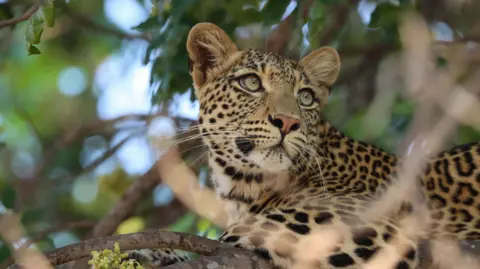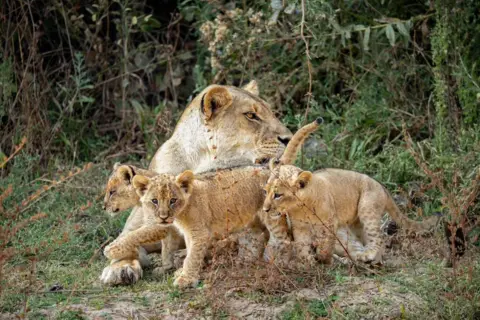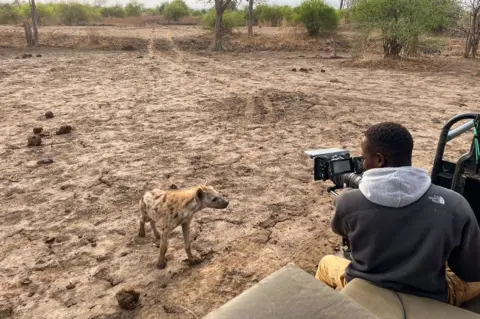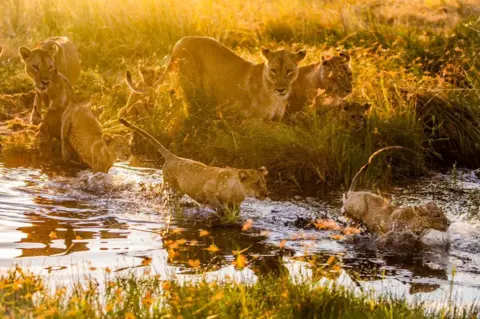New Attenborough doc captures lion saving pregnant hyena from wild dogs
7 hours agoElizabeth DawsonEnvironment Researcher
Rare hyena behaviours have been caught on camera, including a mother-to-be trying to steal food from wild dogs and outsmarting rivals by hiding a stolen carcass underwater to mask its scent.
This is just some of the remarkable animal behaviour on display in the new BBC wildlife documentary series, Kingdom, which follows the lives of four rival carnivore families over five years.
The scenes include poignant moments as the animals face threats from snare trappings to brutal ambushes and violent territorial battles.
“We could never have written a script like this, only nature could write this script,” said executive producer Mike Gunton.
Behind the scenes, the Zambia Carnivore Programme works to protect these animals.

 BBC Studios
BBC StudiosThe team followed four animal families – leopards, hyena, wild dogs and lions – in Zambia’s Luangwa Valley, capturing rare moments and revealing the intricate dynamics of life in one of Africa’s wildest regions.
Viewers will watch five-day-old lion cubs opening their eyes, alongside dramatic scenes shown in Kingdom for the first time, such as a pack of wild dogs rescuing one of their own from the jaws of a crocodile.
Other wild animals like elephants and baboons also feature in the new series, which is narrated by Sir David Attenborough.

 BBC Studios
BBC Studios”Everything about these species has been shaped by millions of years of competition alongside each other,” said series producer Felicity Lanchester. “Now…humans are changing that,” she added.
Filmmakers and scientific researchers in the region have collaborated behind the scenes as the footage is a valuable source of data, informing conservation strategies.
”We got a lot of information that we wouldn’t have been able to get otherwise… on topography, diet, movement, births, and deaths,” said Dr Matthew Becker, scientific consultant for the series and CEO of the Zambia Carnivore Programme.

 BBC Studios
BBC StudiosThe greatest threat these large carnivores face is habitat loss, while snaring and a declining prey base also play a role. Wire traps, or snares, are often set for antelope – both for food and illegal trade – but many large mammals become victims as by-catch.
These pressures are changing pack sizes, diets and survival strategies, according to Dr Becker. A single incident can have knock-on effects, impacting dozens or even hundreds of animals.
In one scene, a wild dog reappears after losing a leg in a snare trap. Despite his injury, his natal pack welcomes him back, ensuring he eats his share and keeps up on hunts.
For those not as fortunate, the Zambia Carnivore Programme exists to protect them. The organisation, along with other local groups, removes snares, safeguards dens and provides information for law enforcement on illegal trade in ivory and bushmeat.

 BBC Studios
BBC StudiosReflecting on the conservation focus of the series, Dr Becker said: “Ultimately, it’s a message of optimism in the face of some very concerning trends.”
Its incorporation in wildlife programmes is now an inevitability, according to the producers.
The external forces acting on these creatures are clear and series like Kingdom can shed light on the need to protect them.
Speaking about conservation, series editor, Simon Blakeney, said: ”It’s a challenge, but it’s not hopeless.”
Kingdom begins on BBC One at 18:20 GMT on Sunday and will be available to watch on BBC iPlayer.